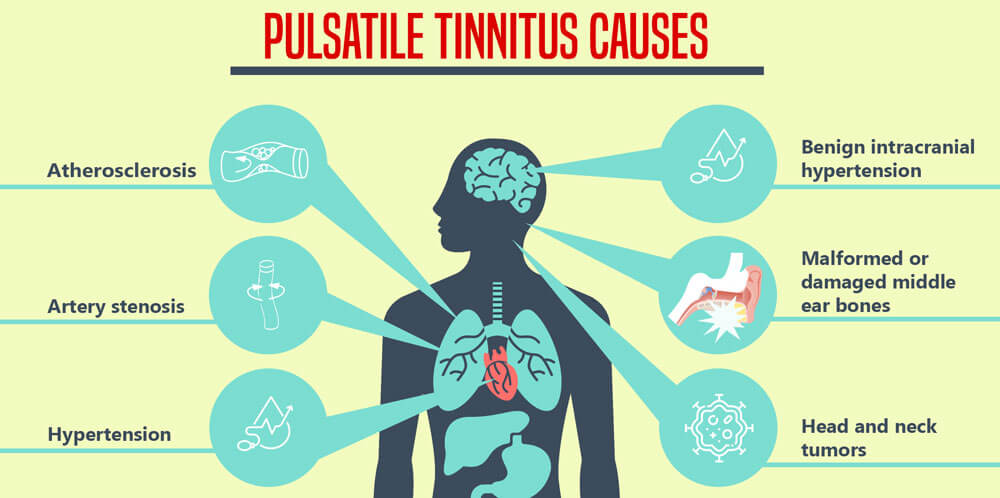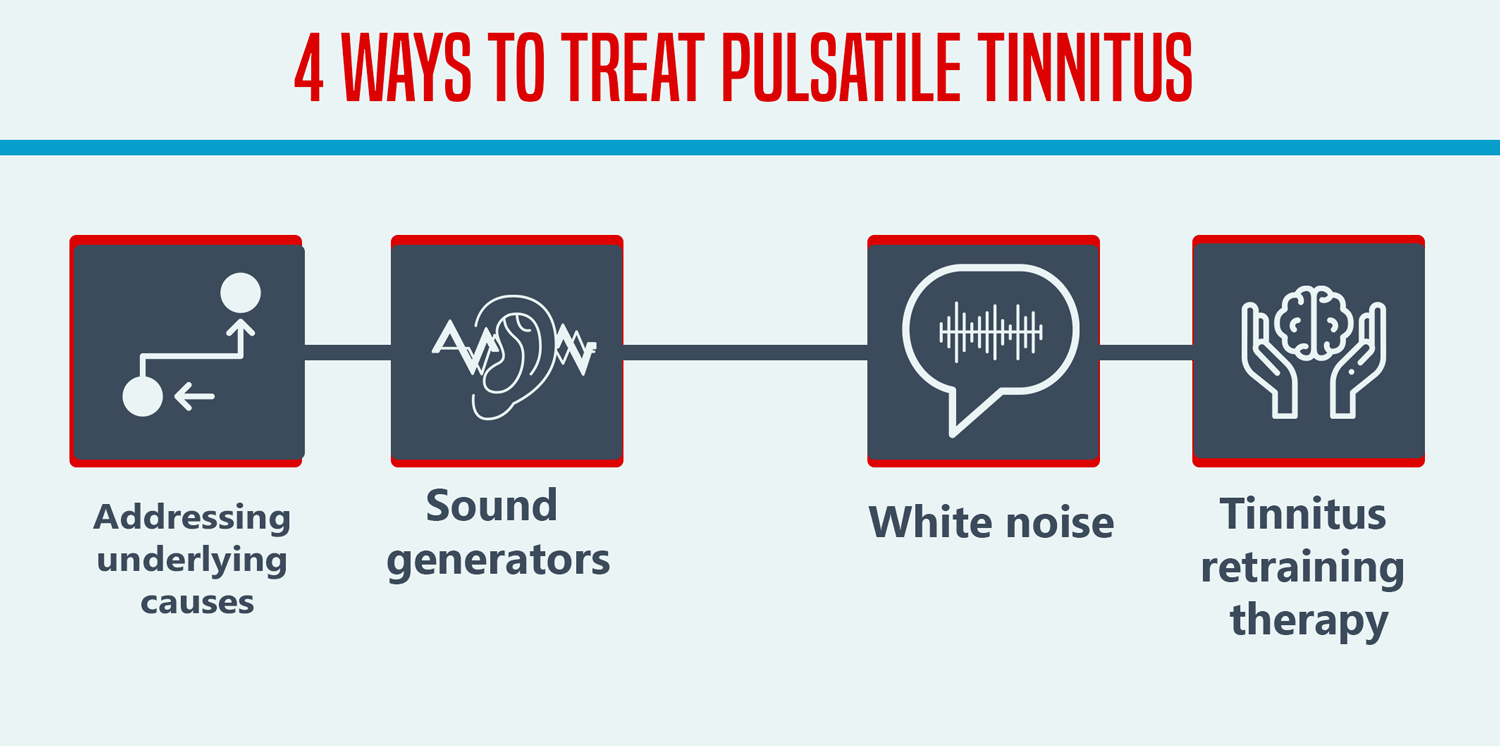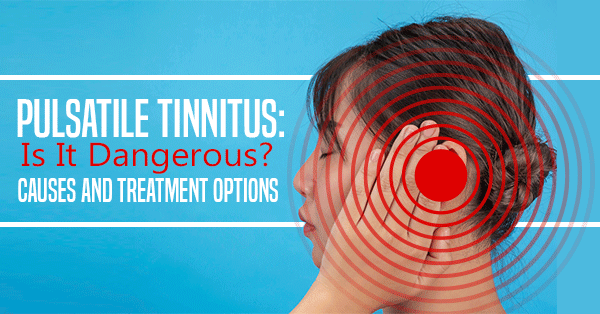What is this thumping sound in my ear? If this is a question you often ask yourself, you might be dealing with pulsatile tinnitus.
Pulsatile tinnitus has different causes and treatment options to the more common ringing tinnitus sound. Read on to find out how you can stop that thumping in your ear from ruining your day and night!
Key Takeaways
- Pulsatile tinnitus is similar to your heart or breathing, perceived inside your head [1].
- High blood pressure, narrowing or blockage in blood vessels, or a tumor could be the cause.
- A tinnitus test can help you determine the type and cause, followed by medical imaging if necessary.
- Treatment can involve drugs or surgery to correct the excess pressure or narrowing.
What Is Pulsatile Tinnitus?
Pulsatile tinnitus is like a thumping or whooshing sound, similar to a heartbeat or blood circulating in your ear [2]. It is classified as “objective” pulsatile tinnitus if your doctor can perceive the sound or rhythm on examination, or “subjective” pulsatile tinnitus if it is only strong enough for you to hear [3].
As pulsatile tinnitus is often linked to problems with blood flow, a tinnitus test will involve the examination of your head, neck and ears alongside a hearing test [4].
Symptoms of Pulsatile Tinnitus
In cases of benign intracranial hypertension, pulsatile tinnitus may appear alongside a headache and blurry vision [5]. This is because elevated intracranial pressure restricts the space your nerves and blood vessels need to function.
However, not everyone will experience symptoms other than that annoying thumping in one or both ears.
Pulsatile Tinnitus Causes
The thumping or whooshing sound heard in pulsatile tinnitus, known as somatosounds, may have an arterial, venous, middle ear, or tumor-related cause, including:

- Atherosclerosis, particularly of the arteries serving your brain
- Artery stenosis, meaning a narrowing of the vessels due to plaques
- Hypertension, including those from pregnancy or an overactive thyroid gland
- Benign (or idiopathic) intracranial hypertension, which almost exclusively affects younger, overweight women [5]
- Malformed or damaged middle ear bones
- Head and neck tumors [1]
A sound that matches up with your heartbeat may be more likely to have an arterial origin, while tinnitus in sync with your breathing could be related to an issue with the veins [5].
If you seem to hear a ringing and thumping in your ear, try a free online hearing test to see if you also have hearing loss. Comparing this and results from a formal hearing test to expected hearing frequency by age can help you determine its cause.
What Causes Pulsatile Tinnitus in One Ear?
The causes of pulsatile tinnitus in only one ear include abnormalities in blood vessels that serve one side of the head, such as the carotid arteries [2]. However, 80% of cases related to intracranial hypertension feature one-sided tinnitus [5].
Pulsatile Tinnitus Diagnosis
A clinical examination from your doctor is the first step in diagnosing the cause. For benign intracranial hypertension and Chiari malformation, examination will find relief of tinnitus when the ipsilateral jugular vein in the side of your neck is compressed. Diagnosing intracranial hypertension is confirmed with lumbar puncture [5].
Next, one or more of several imaging tests may be used to confirm the type of pulsatile tinnitus you have. Ultrasound examination or angiography can detect certain vascular issues, for example. MRI and CT scans may uncover both problems with blood flow and other causes, such as tumors [2].
Pulsatile Tinnitus Treatment
The causes of pulsatile tinnitus determine treatment, one of the following may be recommended for you:

- Addressing underlying causes, such as intracranial hypertension
- Sound generators
- White noise
- Tinnitus retraining therapy
Address Underlying Causes
When conditions such as atherosclerosis, heart murmur or intracranial hypertension are the causes, medication can effectively manage them and eliminate or at least reduce the sound of a heartbeat in your ear [3].
For benign intracranial hypertension, diuretic drugs and weight loss are standard treatments, but shunting procedures may be needed to relieve more pressure. If a tumor is behind your pulsatile tinnitus, then surgery is necessary to remove it.
Narrowed blood vessels can be treated with stenting, which relieves turbulent blood flow, while Chiari malformation is managed with surgical decompression [5].
Severe atherosclerosis can be treated with endarterectomy or ligation surgery, depending on where the issue is. Endarterectomy is the surgical removal of plaque from the arteries to improve blood flow [6]. Stenosis (narrowing) has endarterectomy as an option too. People with over 70% stenosis benefit more from endarterectomy surgery than medication [3].
Sound Generators
If a normal variation in the structure of your bones or blood vessels is causing your pulsatile tinnitus, there may be no treatment. Instead, you may just need accommodations to live comfortably with it.
One of these is sound therapy, which adds more noise to your environment so you don’t hear tinnitus as well. Specific sounds are chosen to drown out the tinnitus frequency by matching it, so a heartbeat in your ear may be matched with low sounds. Evidence is mixed on whether this provides temporary relief, or retrains the brain to ignore sounds it shouldn’t perceive [7].
If hearing loss is part of the problem for you, read more about hearing aids in our MDHearingAid review.
White Noise
White noise is that hissing, roaring sound you get when your radio isn’t properly tuned into a station. As it matches the tinnitus sound in many cases, you may benefit from this type of sound therapy specifically.
Tinnitus Retraining Therapy
Tinnitus retraining therapy combines sound therapy with counseling. The aim is to reduce both your perception of the noise and your emotional reactions. You can still hear tinnitus, it would just bother you less. The cause doesn’t matter, because treatment works on the auditory pathways and other regions of the brain [8].
Additional screening such as a tone deaf test may be needed to get a clear picture of your sound perception.
Outlook: How Serious is Pulsatile Tinnitus?
Pulsatile tinnitus can indicate a serious underlying condition, so it is essential that you get a full diagnosis as soon as possible. Some patients are only diagnosed after 70% of their carotid artery diameters are narrowing, and treatment is necessary to prevent complications such as stroke [3].
As for intracranial hypertension, treatment is important to prevent the possibility of vision loss in the future [9].
FAQ
What are the most important things to know about pulsatile tinnitus?
Can You Have Tinnitus and Pulsatile Tinnitus?
Yes, you can have both since “regular” tinnitus and pulsatile tinnitus have different causes. For example, you may have pulsatile from an atherosclerotic plaque, and the regular type from age-related hearing loss. However, you may not notice one if the other drowns it out.
What Is the Most Common Cause of Pulsatile Tinnitus?
Pulsatile tinnitus is commonly caused by malformations or disorders in the arteries and blood vessels.
Why Do I Have Pulsatile Tinnitus At Night?
You may have a milder case, which is only noticeable when your environment is quiet. Lying down also allows for general increased blood flow to the head, raising pressure and making that steady beat more noticeable [5].
Why Do I Have Pulsatile Tinnitus When Bending Over?
Thanks to gravity, the pressure inside your head increases when you bend over as more blood is present [5]. If you have a slight variation in the blood vessel or bone structure or milder case of narrowed arteries, you may only notice pulsatile tinnitus then.
Is It Normal That Pulsatile Tinnitus Changes With Head Position?
It is common for pulsatile tinnitus to get better or worse from moving around, including in cases of intracranial hypertension and Chiari malformation [5]. This is because a particular position can put more pressure on the bone or blood vessel causing the problem.
Will Pulsatile Tinnitus Go Away?
In cases of intracranial hypertension, you may notice the thumping in your ears get quieter or disappear if you lose weight [9]. It’s still best to get a diagnosis in case the cause is something else.
Should I Be Worried About Pulsatile Tinnitus?
Be concerned, but don’t panic. The conditions that can cause pulsatile tinnitus are often serious, but treatable.
Is Pulsatile Tinnitus Dangerous?
Pulsatile tinnitus is not dangerous in itself but can be a sign of a dangerous underlying condition.
Conclusion
Pulsatile tinnitus is an annoying form of tinnitus based on your heartbeat or breathing. While not harmful in itself, it can be a sign of blood vessel narrowing, intracranial high blood pressure or a tumor. Treatment can be effective and lifesaving depending on the cause, so it’s best to get diagnosed as soon as you can.
References
- “Algorithm for Evaluation of Pulsatile Tinnitus.” Taylor & Francis, www.tandfonline.com/doi/abs/10.1080/00016480701840106.
- Waldvogel, Daniel, et al. “Pulsatile Tinnitus -a Review of 84 Patients.” Journal of Neurology, Steinkopff-Verlag, link.springer.com/article/10.1007/s004150050193.
- Hadizadeh, Ahmad Daneshil Homayoun, et al. “Pulsatile Tinnitus and Carotid Artery Atherosclerosis.” The International Tinnitus Journal, The International Tinnitus Journal, 16 Dec. 2004, www.tinnitusjournal.com/abstract/pulsatile-tinnitus-and-carotid-artery-atherosclerosis-5665.html.
- “What Is Tinnitus? – Causes and Treatment.” National Institute of Deafness and Other Communication Disorders, U.S. Department of Health and Human Services, www.nidcd.nih.gov/health/tinnitus.
- De Ridder D; Menovsky T; Van de Heyning P; “An Otoneurosurgical Approach to Non-Pulsatile and Pulsatile Tinnitus.” U.S. National Library of Medicine, pubmed.ncbi.nlm.nih.gov/18225613/.
- “Carotid Endarterectomy.” National Heart Lung and Blood Institute, U.S. Department of Health and Human Services, www.nhlbi.nih.gov/health-topics/carotid-endarterectomy.
- M;, Pienkowski. “Rationale and Efficacy of Sound Therapies for Tinnitus and Hyperacusis.” Neuroscience, U.S. National Library of Medicine, pubmed.ncbi.nlm.nih.gov/30244031/.
- PJ, Jastreboff. “25 Years of Tinnitus Retraining Therapy.” HNO, U.S. National Library of Medicine, pubmed.ncbi.nlm.nih.gov/25862626/.






Leave a Reply